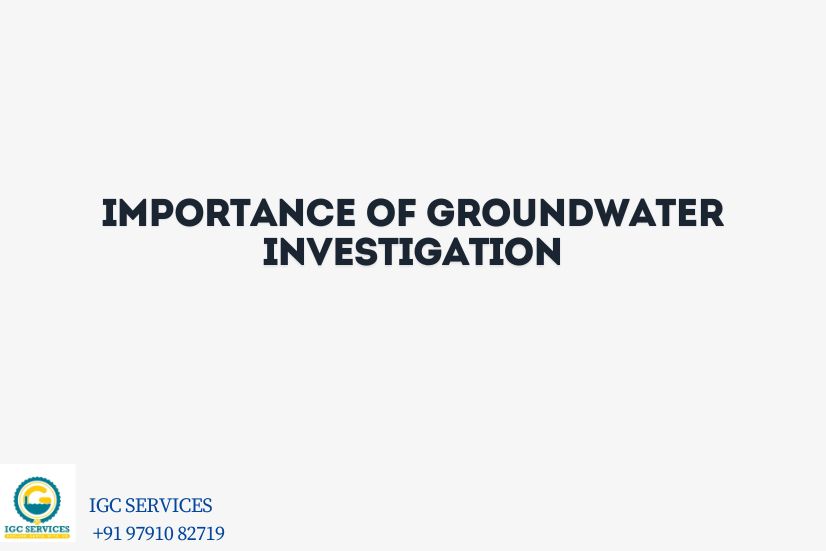
Groundwater is a vital resource that sustains agricultural, industrial, and domestic needs across the globe. As populations grow and climate patterns shift, the demand for reliable water sources increases. Therefore, understanding groundwater systems is essential for effective management and sustainable usage. At IGC Services, we emphasize the importance of groundwater investigation, particularly through geophysical methods such as the Schlumberger method, to ensure we can provide reliable data for various applications.
Understanding Groundwater
Groundwater refers to the water found beneath the Earth’s surface, filling the spaces between soil particles and the fractures in rocks. It serves as a critical source of drinking water for billions of people and supports irrigation and industry. Groundwater aquifers are dynamic systems influenced by natural processes such as precipitation, evaporation, and human activities.
The Need for Groundwater Investigation
Groundwater investigation involves assessing the quantity, quality, and flow of groundwater in a particular area. This investigation is crucial for several reasons:
Resource Management: Understanding groundwater resources is essential for managing and conserving water supplies. Investigations help determine how much water can be sustainably extracted without depleting aquifers.
Environmental Protection: Groundwater can be contaminated by agricultural runoff, industrial waste, and septic systems. Investigating groundwater helps identify contamination sources and implement remediation strategies to protect this vital resource.
Infrastructure Development: Construction projects often require a thorough understanding of groundwater conditions. Investigations can inform engineers about potential issues related to water tables, soil stability, and drainage systems, ensuring that infrastructure is built safely and sustainably.
Hydrological Modeling: Groundwater investigations support hydrological modeling, which predicts how groundwater interacts with surface water, such as rivers and lakes. This understanding is vital for managing water resources, especially in regions susceptible to drought or flooding.
Climate Change Adaptation: As climate patterns change, groundwater levels can fluctuate. Investigations provide data that help communities adapt to these changes, ensuring water availability during dry periods.
The Role of Geophysical Methods
At IGC Services, we primarily utilize geophysical methods to conduct groundwater investigations. These non-invasive techniques provide valuable insights into subsurface conditions without the need for extensive drilling or excavation. Among these methods, the Schlumberger method is particularly effective for determining groundwater potential.
What is the Schlumberger Method?
The Schlumberger method is a widely used electrical resistivity technique that measures the resistance of subsurface materials to the flow of electrical current. It involves placing electrodes into the ground and passing an electric current through them. By measuring the resulting voltage difference, geophysicists can infer information about the resistivity of the soil and rock layers.
Advantages of the Schlumberger Method
Cost-Effective: Compared to traditional drilling methods, the Schlumberger method is relatively inexpensive. It requires fewer resources and less time, making it a cost-effective option for groundwater investigations.
Non-Invasive: This method does not disturb the ground, preserving the integrity of the site. This is particularly important in sensitive areas, such as those near water bodies or ecological reserves.
High Resolution: The Schlumberger method can provide detailed information about the subsurface structure, including the depth and thickness of aquifers, which is crucial for understanding groundwater flow.
Fast Data Collection: Geophysical surveys can cover large areas quickly, allowing for comprehensive assessments of groundwater conditions in a short timeframe.
Versatility: This method can be applied in various geological settings, making it suitable for diverse environments, from urban areas to remote locations.
Application of the Schlumberger Method
The Schlumberger method is particularly useful for:
Aquifer Characterization: It helps determine the properties of aquifers, such as porosity, permeability, and hydraulic conductivity, essential for effective groundwater management.
Identifying Contamination: The method can detect variations in resistivity that may indicate contamination in groundwater, allowing for targeted remediation efforts.
Mapping Subsurface Structures: The Schlumberger method assists in mapping geological formations, helping identify potential aquifer recharge zones and areas of groundwater discharge.
Monitoring Groundwater Levels: Regular geophysical surveys can track changes in groundwater levels over time, providing valuable data for resource management and planning.
The Impact of Groundwater Investigation on Communities
Effective groundwater investigation has far-reaching impacts on communities:
Sustainable Water Supply: By accurately assessing groundwater resources, communities can ensure a sustainable supply of water for domestic, agricultural, and industrial use, reducing dependence on surface water sources.
Economic Development: Reliable groundwater access supports economic growth by facilitating agricultural production, attracting businesses, and creating jobs in water-intensive industries.
Public Health: Protecting groundwater quality directly impacts public health. Investigations help identify contamination sources, ensuring safe drinking water for communities.
Resilience to Climate Change: Communities equipped with knowledge about their groundwater resources can better adapt to changing climate conditions, ensuring water availability during periods of drought or water scarcity.
அறிவியல் முறையில் நிலத்தடி நீரை கண்டுபிடித்தல்
கடந்த காலத்தில் மழைநீர் மற்றும் நிலத்தடி நீரை ஆராய்வது அவசியமாகிவிட்டது. நிலத்தடி நீர் காண்பதற்கான பரிசோதனைகள், புவியியல் முறையில் ச்ளம்பர்ஜர் முறை போன்ற நுண்ணோக்கிகள் உதவுகின்றன. இதன் மூலம் நிலத்தடி நீரை மிக துல்லியமாக கண்டறியலாம் .
நீங்கள் எங்களை தொடர்புகொண்டால், உங்களுக்கான அனைத்து பரிசோதனைகளை அறிவியல் அடிப்படையில் வழங்குவோம். நமது வல்லுநர்கள் நிலத்தடி நீர் ஆராய்ச்சி மற்றும் பரிசோதனை பற்றிய அனைத்துப் தகவல்களையும் தருவார்கள். உங்கள் தேவைகளை பூர்த்தி செய்வதற்காக எங்களை அணுகவும்!
Conclusion
Groundwater is an essential resource that requires careful management and investigation. At IGC Services, we recognize the importance of understanding groundwater systems through effective methods like the Schlumberger technique. By investing in groundwater investigation, we can provide communities with the data needed to manage this precious resource sustainably, ensuring water availability for future generations. Through our commitment to excellence and innovation, we strive to be leaders in groundwater investigation, making a positive impact on the environment and the communities we serve.
